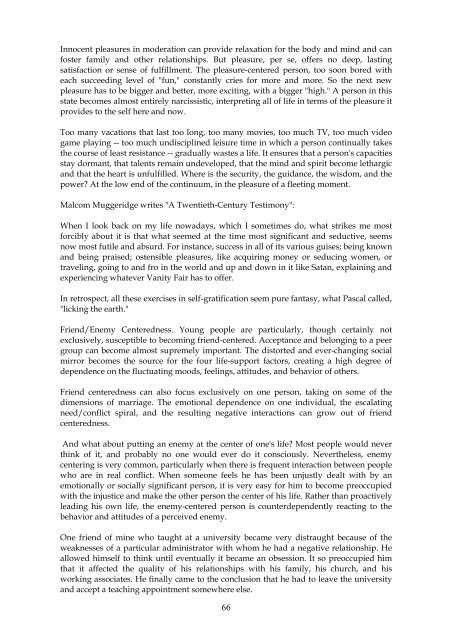Covey - The 7 habits of highly effective people
Create successful ePaper yourself
Turn your PDF publications into a flip-book with our unique Google optimized e-Paper software.
Innocent pleasures in moderation can provide relaxation for the body and mind and can<br />
foster family and other relationships. But pleasure, per se, <strong>of</strong>fers no deep, lasting<br />
satisfaction or sense <strong>of</strong> fulfillment. <strong>The</strong> pleasure-centered person, too soon bored with<br />
each succeeding level <strong>of</strong> "fun," constantly cries for more and more. So the next new<br />
pleasure has to be bigger and better, more exciting, with a bigger "high." A person in this<br />
state becomes almost entirely narcissistic, interpreting all <strong>of</strong> life in terms <strong>of</strong> the pleasure it<br />
provides to the self here and now.<br />
Too many vacations that last too long, too many movies, too much TV, too much video<br />
game playing -- too much undisciplined leisure time in which a person continually takes<br />
the course <strong>of</strong> least resistance -- gradually wastes a life. It ensures that a person's capacities<br />
stay dormant, that talents remain undeveloped, that the mind and spirit become lethargic<br />
and that the heart is unfulfilled. Where is the security, the guidance, the wisdom, and the<br />
power? At the low end <strong>of</strong> the continuum, in the pleasure <strong>of</strong> a fleeting moment.<br />
Malcom Muggeridge writes "A Twentieth-Century Testimony":<br />
When I look back on my life nowadays, which I sometimes do, what strikes me most<br />
forcibly about it is that what seemed at the time most significant and seductive, seems<br />
now most futile and absurd. For instance, success in all <strong>of</strong> its various guises; being known<br />
and being praised; ostensible pleasures, like acquiring money or seducing women, or<br />
traveling, going to and fro in the world and up and down in it like Satan, explaining and<br />
experiencing whatever Vanity Fair has to <strong>of</strong>fer.<br />
In retrospect, all these exercises in self-gratification seem pure fantasy, what Pascal called,<br />
"licking the earth."<br />
Friend/Enemy Centeredness. Young <strong>people</strong> are particularly, though certainly not<br />
exclusively, susceptible to becoming friend-centered. Acceptance and belonging to a peer<br />
group can become almost supremely important. <strong>The</strong> distorted and ever-changing social<br />
mirror becomes the source for the four life-support factors, creating a high degree <strong>of</strong><br />
dependence on the fluctuating moods, feelings, attitudes, and behavior <strong>of</strong> others.<br />
Friend centeredness can also focus exclusively on one person, taking on some <strong>of</strong> the<br />
dimensions <strong>of</strong> marriage. <strong>The</strong> emotional dependence on one individual, the escalating<br />
need/conflict spiral, and the resulting negative interactions can grow out <strong>of</strong> friend<br />
centeredness.<br />
And what about putting an enemy at the center <strong>of</strong> one's life? Most <strong>people</strong> would never<br />
think <strong>of</strong> it, and probably no one would ever do it consciously. Nevertheless, enemy<br />
centering is very common, particularly when there is frequent interaction between <strong>people</strong><br />
who are in real conflict. When someone feels he has been unjustly dealt with by an<br />
emotionally or socially significant person, it is very easy for him to become preoccupied<br />
with the injustice and make the other person the center <strong>of</strong> his life. Rather than proactively<br />
leading his own life, the enemy-centered person is counterdependently reacting to the<br />
behavior and attitudes <strong>of</strong> a perceived enemy.<br />
One friend <strong>of</strong> mine who taught at a university became very distraught because <strong>of</strong> the<br />
weaknesses <strong>of</strong> a particular administrator with whom he had a negative relationship. He<br />
allowed himself to think until eventually it became an obsession. It so preoccupied him<br />
that it affected the quality <strong>of</strong> his relationships with his family, his church, and his<br />
working associates. He finally came to the conclusion that he had to leave the university<br />
and accept a teaching appointment somewhere else.<br />
66


